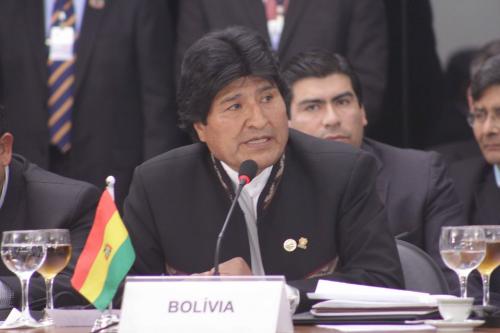OAS “misrepresented data and evidence” in final audit report on Bolivian elections
- Información

A major new study from the Center for Economic and Policy Research (CEPR) examines flaws in the “Final Report” of the Organization of American States (OAS) audit of Bolivia’s October election results and shows that the authors of that report misrepresented data and evidence in an apparent attempt to support previous OAS claims of intentional manipulation on the part of Bolivia’s former electoral authorities. The CEPR paper follows a recent much-publicized statistical analysis of Bolivia’s election results by Jack Williams and John Curiel, two researchers whom CEPR had commissioned and who work with the MIT Election Data and Science Lab.
The OAS has criticized CEPR’s previous analysis, as well as that of Williams and Curiel, for neglecting certain aspects of the Bolivian elections, such as flawed ballot tally sheets and the presence of “hidden servers” used in processing election results. The new 82-page CEPR paper, “Observing the Observers,” by research associate Jake Johnston and economist David Rosnick, examines these and other factors in detail, providing a comprehensive rebuttal to the OAS’s Final Report, and finding that “it does not provide any evidence that those irregularities altered the outcome of the election, or were part of an actual attempt to do so.”
“It is clear that the OAS Final Report, which the organization has trumpeted as the last word on what happened in Bolivia’s elections, does not offer the necessary evidence to show that there was fraud, and that it affected the election results,” Jake Johnston said. “Rather, it seems intended to justify rushed and ultimately indefensible, but very damaging, accusations that the OAS has repeatedly made, beginning the day after the elections.”
After the OAS helped perpetuate a false narrative of fraud, Bolivia’s de facto government has used the Final Report to justify the ouster of President Morales, its antidemocratic consolidation of power and its persecution of former government officials. Dozens of former electoral officials are currently detained pending trial for alleged involvement in electoral fraud.
The CEPR study finds that the OAS Final Report:
- is based on flawed statistical analyses and incorrect assumptions;
- buries or conceals altogether the results of its verification exercises despite the fact that they are highly relevant;
- presents no evidence pointing to the manipulation of election results;
- presents no information indicating that problems with the TREP (preliminary count), real or alleged, compromised the Cómputo (official count) or that the Cómputo was fraudulently altered;
- fails to provide clarity around the TREP stoppage and, as a result, perpetuates a false narrative of fraud.
The CEPR study notes, “The Final Report presents contradictory information relating to the TREP. It claims there was no technically valid reason to stop the TREP, but then includes more than a dozen findings related to technical problems with the TREP that emerged before the stoppage.”
While the OAS Final Report identifies the stoppage of the TREP as an act of “intentional manipulation,” it fails to note that Ethical Hacking, the audit company whose analysis the OAS Final Report features prominently, sent a “maximum alert” to the electoral authority just before the decision was made to stop the TREP. Further, during the stoppage, the auditing company investigated the “unauthorized” server which was the subject of the alert and determined no data had been altered or manipulated. These basic facts are not mentioned in the OAS Final Report.
The CEPR study warns: “A multilateral organization that is called upon to resolve an electoral dispute must be honest, impartial, and credible. This study shows that the OAS was none of these in the case of the Bolivian electoral crisis of 2019. The unethical conduct of the OAS in Bolivia has had deeply disturbing consequences.”
“The OAS actions in Bolivia are just the latest example of an organization, which under the leadership of Secretary General Luis Almagro, has given up all pretenses of neutrality,” Johnston said. Almagro is hoping to secure his reelection atop the multilateral organization in a March 20 vote.
“The OAS continues to make claims utterly at odds both with data made publicly available in real time during both the quick and official counts and with their own presentation of the data,” David Rosnick said. “Following many reasonable questions from statisticians, the Final Report confirms that the OAS had no basis for its assertion on October 21 that there was something strange and unexplainable about the preliminary count that showed Morales with a first-round victory. In lieu of reasoned argument, the OAS chose, disappointingly, to engage in ad hominem attacks.”
In December, the OAS Permanent Council prevented CEPR from presenting its findings alongside those of the OAS, as the Mexican government’s representative to the body had requested.
“Hopefully third parties will welcome this report with the intellectual curiosity and academic rigor that it, and the OAS’s Final Report itself, deserves,” Johnston added.
Washington, DC, March 10, 2020
Del mismo autor
- Estados Unidos deberá investigar las denuncias sobre las elecciones de Bolivia en 2019 17/03/2022
- Informe muestra que el gobierno posterior al golpe provocó “daños económicos” 24/06/2021
- Possible recurrence of OAS electoral fraud in Bolivia 16/10/2020
- Bolivia: cambios en elecciones harán menos transparentes los resultados 16/10/2020
- Response to OAS Secretary-General Luis Almagro regarding Bolivia’s 2019 elections 18/06/2020
- La OEA sabía que no había fraude electoral, pero siguió repitiendo acusaciones falsas 10/06/2020
- New York Times and New Report confirm CEPR analysis refuting OAS claims of flawed Bolivian election results 08/06/2020
- ‘El G20 debe pedir al FMI que emita 3 billones de Derechos Especiales de Giro’ 30/03/2020
- 'G20 Should Call for IMF to Issue 3 Trillion SDRs' 28/03/2020
- US Government should immediately lift economic sanctions to avoid causing more deaths from pandemic 19/03/2020
